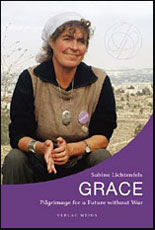Sabine Lichtenfels is an author, freelance theologian, peace activist, and founder of the Healing Biotope I Tamera in Portugal. For years, she has been involved in international peace work, community development, conflict resolution, and reconciliation of the genders. In this laudable and profound work translated from German by Frieda Julie Radford, Lichtenfels shares the insights gained on a pilgrimage in June of 2005, first to Santiago de Compostala and then to to Israel and Palestine where for three weeks she led a group of 40 people through these war-torn and tense countries. At the start of this spiritual adventure, Lichtenfels gives away her possessions, and vows to listen to her inner voice, to cover long distances by foot without any money, and to end war and live peace.
The author envisions a Movement for a Free Earth which she calls GRACE. It has the goal of working for world peace, serving the earth, and developing peace villages. Here are some of the rules for those in the movement:
• "GRACE serves life and its peaceful unfolding. We face each other with respect, solidarity, and readiness to help.
• In the name of GRACE we refuse to be enemies.
• We leave each place we entered a little richer and more beautiful.
• We behave in such a way that we do not harm any other being. Every creature has a right to life."
After traveling through many countries and spreading the word about ending war, Lichtenfels and her group arrive in Israel and the West Bank where they perform their play "We Refuse to Be Enemies." The author remembers her positive feelings at the nonviolent dismantling of the Berlin Wall. She laments the anger, fear, and hatred that lies behind the Israeli wall on the border of the West Bank. She leads a night vigil there and shares a powerful meditation for a realistic peace alternative to this wall of separation between Israel and Palestine.
In the West Bank, Lichtenfels listens to stories of pain, suffering, and injustice. She also sees signs of hope in a concert in Jerusalem. Near the end of the book, Lichtenfels criticizes the pernicious effects of having an external enemy to hate, fight, and kill. She says: "As long as we are not willing to recognize the human being behind every enemy there will be no peace." And then she goes even further:
"Look for what you hate in others within yourself. Encounter the opponent as if you are looking for the Messiah in him. You want your enemy to disappear? You will achieve his disappearance once you recognize and touch this divine point in him, this point which has never before been recognized and touched. This is the deciding point of transformation."
Heavy and demanding stuff. It has to be so given the rampant global and local violence. Loving the enemy is a universal challenge which should be taken up by a cooperative effort of all the world's major religions. Contemplation is the starting point but it needs to be wedded with compassionate and nonviolent action in the world.
